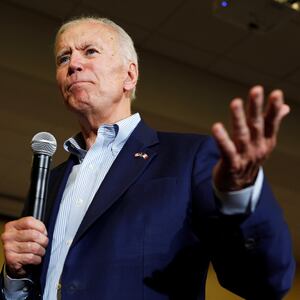Until last week it was unclear what issue would define Wednesday and Thursday’s highly anticipated first 2020 Democratic debates, either substantively or subconsciously.
A case could have been made for the chaos that is our current Iran foreign policy, or who is and who isn’t a proponent of socialism. But instead, former Vice President Joe Biden’s ill-timed decision to revive an anecdote about how chummy he used to be with white supremacists pulled the Band-Aid off what this primary fight has always been about, at least until now: race.
When Hillary Clinton’s shocking 2016 defeat left Democrats desperate for answers and also, in some cases, someone to blame, two principle conclusions could be drawn from the loss: that the white vote was solidifying behind Republicans (apparently any would do); and the Democrats’ fate in general elections rests on how enthusiastic minority voters are about them.
Following the historic 2018 midterms, pundits like Jamelle Bouie were predicting that the eventual Democratic nominee should and would be a person of color, if for no other reason than to offset the unshakable Trump base. And yet, with so many to choose from (a record six candidates of color have mounted serious campaigns for the White House), the Democratic primary polls so far have been dominated by white candidates, and often literally two of the whitest.
It seems that the electability argument tends to skew white, while the enthusiasm argument sometimes swings the other way. And even when the case is made that you can’t have one without the other, nervous progressives point to Trump’s war chest and truly formidable durability (people used to joke about his presidency ending in a month, now they just hope he leaves at some point) and say this is not the time to take a risk on anyone who doesn’t fit a traditional mold.
But this past week presented the potential dangers of Biden’s candidacy (a.k.a, Gran Torino: The Campaign), and it provided a rare moment for Senators Cory Booker and Kamala Harris—who could uniquely speak to the upset the vice president’s words caused for African-Americans, but who also have been largely relegated to the lower tiers of 2020 candidacies by the press—to shine.
How it must have irked Booker and Harris, two of the brightest stars in their party, to see upstarts Rep. Beto O’Rourke and now Mayor Pete Buttigieg become the flavor of the month, while their candidacies struggled to get airtime.
Now, they may be getting a second look from voters.
It’s true the cable news networks love to see a fight, and the Booker-Biden flap is the closest this primary has had to a real one so far. Some minor jibes aside, most of the 2020 candidates had been holding their fire on the front-runner out of fear of coming at the king, missing, and becoming the first casualty, of which there will be many.
But Booker’s blows landed, because they appeared to come from a place of genuine pain and truth, and they served as a reminder that this Rhodes Scholar-turned inner city mayor-turned folk hero-turned institutionalist senator might not be such an unattractive option.
Unfortunately for the senator, he didn’t draw a spot in the second night of Democratic debates, and so he and audiences will be deprived of the showdown they desperately want. Biden’s front-running status, while formidable, remains soft, and even his core supporters must be anxious about whether the 76-year-old has the stamina to withstand the barrage of attacks from hipper, more socially conscious and yes, more colorful candidates competing to supplant him.
But rest assured, this gaffe will not easily get overshadowed—unless of course Biden decides to start pining in public for Amos ’n’ Andy re-runs—because it speaks to the tensions between the Democratic Party leadership and a black base that it desperately needs but keeps alienating.
It would not be unfair for politically engaged people of color to presume the Democrats have learned little from the debacle of 2016.
Sure, the fact exists in the minds of some experts that four million Obama supporters, who were disproportionately black, staying home is what cost Clinton the Electoral College.
And of course, anyone read-in on the Mueller investigation understands that African-Americans were a key target of Russian interference in the election. But instead of trying to re-engage these voters through culture and policy, the mainstream of the Democratic Party has arguably spent too much of the past two and a half years trying to persuade white people who have been trending away from them for decades to come back into the fold.
There has been some evidence that the candidates themselves are at least trying to course correct. A not insignificant number of them have signed on to study the issue of slavery reparations, which would have been unthinkable four years ago (even Obama used to scoff at the idea), and the president obliges them with a steady diet of racist invective for them to condemn.
But Democrats should not presume that black voters, so reliable and practical historically, can be wooed by any one issue or posture. They will decide the nominee by dominating primaries in states like South Carolina, and they have every right to expect an agenda and candidate who doesn’t have to assure them they’re not racist.
These voters in particular will have a specific stake in this week’s debates, and they should expect to see Harris, Booker, and the other candidates of color hold not just Biden, but old school Democrats like him, accountable for their shortcomings on race.
Whoever can emerge from that confrontation the least unscathed may be the best poised to claim victory over the rest of the massive Democratic field.






